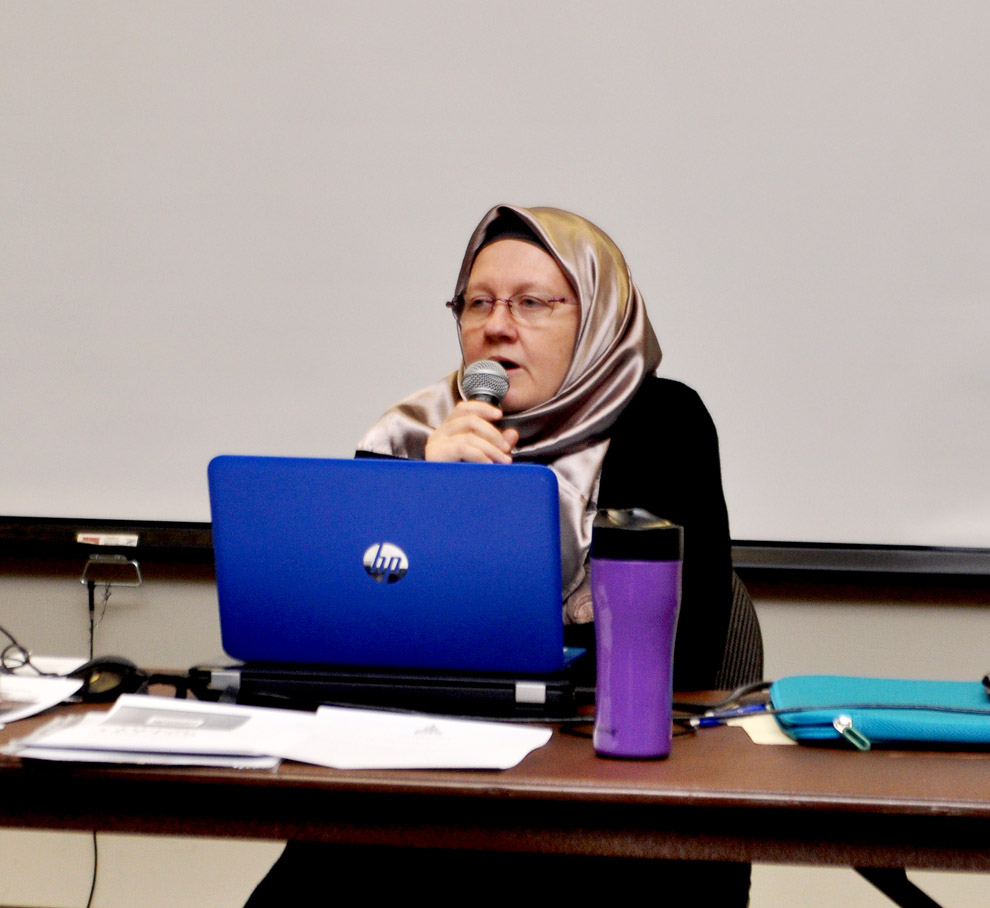
(Barbara Helms speaks in Brockville Monday afternoon.)
A pro tip for anyone who sees red and reaches for his gun whenever someone mentions Islam: Don't do the verse thing.
I refer to the practice, common among both haters and promoters of any religion, of lifting one verse from said religion's Holy Book and holding it up as evidence that said religion is either a beacon of peace or a festering wound upon the Earth spewing forth terrorists and extremists.
The fact is, neither of these things can be proven by a single verse lifted out of context. As a Christian, I've been subjected to the Verse Treatment and I am not about to condone the same thing being done to Muslims.
That said, I will acknowledge it is sometimes difficult to provide full context.
Such was my dilemma Monday evening, as I came back from a presentation by Cornwall-based Islam expert (and longtime Muslim convert) Barbara Helms.
In the space of roughly an hour, I heard more about Islam and its history – an honest, nuanced portrait, in fact – than I ever had before.
I learned what a Twelver is; that The Hidden Imam is not the title of a bad spy thriller set in the Middle East; and that mosques across the West are removing the shahada from their walls because ISIS has been so perversely successful at turning it into “their flag.”
I was also reminded that, when traumatized people from war-torn areas arrive here, they will bring cultural norms and assumptions that seem strange to us.
However, I failed to anticipate the visceral reaction from some quarters as a result of a simple handshake.
When she reached the subject of cultural factors, Helms noted that, in many Middle Eastern cultures, physical contact between men and women to whom they are not related is considered immodest.
Helms made the suggestion – not a fatwa, a suggestion – that men who meet women recently arrived from Syria might want to wait and see whether they make eye contact, or offer their hand to be shaken, before doing so.
Mayor David Henderson later offered up a humourous anecdote on the same subject, with the punchline being that he had momentarily failed to do what every politician aims to do: Win over the room.
Others, however, saw in this the ever-present spectre of “Accommodation.”
One of my newsroom colleagues was genuinely annoyed at the prospect of someone telling us how we Canadians should behave with newcomers.
An email in my queue this morning preceded a Verse Treatment with the following: “So when Muslim immigrants come to Canada tell them we shake hands with men and women and change accordingly. This is Canada they can change.”
Had the author of these words been at Monday's event, he would have heard Helms talk about integration being the goal.
It is the desired middle ground between assimilation (giving up one's entire native culture, an outcome that, for generations, has been considered un-Canadian) and isolation (immigrants living in enclaves that barely interact with the dominant culture, which is a recipe for disaster).
Integration means keeping your native culture, or at least those parts of it that are adaptable to your new home, while adopting the general norms and practices of the host culture. It means, as Helms noted, telling newcomers their children will adopt the behaviours of their new country, and here's how to accept that.
It is the kind of compromise and middle ground thinking that has come to characterize Canadians, the kind of thinking that has allowed us to exist as the product of two European empires and a wealth of First Nations cultures.
Integration, however, does not come easily.
We have seen this difficulty in the past. Decades before I was born, my grandfather navigated this difficulty when he came here from Ukraine. My dad even has a story about the time my grandfather was reprimanded for strangling a chicken in the street, on the way home from market.
There are those among us who reject the entire mission of Refugees for Brockville; for them being polite by bowing slightly to a woman rather than sticking out one's hand is just the initial push down the slippery slope to Shariah Law.
However, out of respect for those many Canadians who long ago were reasonable to my grandparents, and who did not lose their identity in the process, I will choose to believe this is an overreaction, and politeness is not surrender.